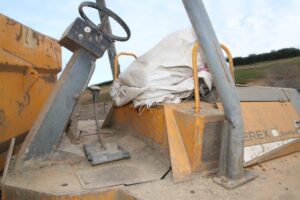New regulator takes major step forward in ‘landmark moment for building safety’
- Regulator to protect high-rise residents in England from unsafe building practices
- 12,500 buildings must be registered with the Building Safety Regulator
- New ‘Be Ready’ campaign calls on industry to prepare for the new safety regime
Those responsible for the safety of high-rise residential buildings in England have six months from April to register with the new Building Safety Regulator.
The Building Safety Regulator was established to protect high-rise residents from unsafe building practices in England in response to the Grenfell Tower fire.
Under the Building Safety Act, high-rise residential buildings which are 18 metres tall or higher, or at least seven storeys, with two or more residential units are defined as ‘higher-risk’.
Across England there are approximately 12,500 of these buildings and the new regulator will require all of them to be registered from April 2023, with a named person responsible for maintaining their safety.
A new campaign aimed at owners and managers of high-rise residential buildings will highlight their new legal duties. It will call on those responsible for the safety management of higher-risk buildings to prepare for a new wave of regulatory change to ensure that they are ready to step up and comply.
The registration process is a crucial stage in setting up the new building safety regime. Registering buildings in scope will be a legal requirement and owners and managers who fail to comply by October 2023 will be investigated and may face prosecution.
HSE Chief Executive Sarah Albon said: “This registration process is an important step towards building a safer future for residents of high-rise buildings. We want it to be clear where responsibility for safety in these buildings lies.
“As the Building Safety Regulator, we will draw from our experience to provide guidance and oversight for the industry and lay the foundation for a world-leading building safety regime, which is a part of our mission to protect people and places.”
Chief Inspector of Buildings Peter Baker said: “Our message is clear – industry must raise its standards and residents of high-rise buildings in England must be kept safe.
“This is a landmark moment for building safety, the information provided through registration will be an invaluable part of our crackdown on unsafe building practices. Those who are responsible for high-rise residential buildings must register; failure to do so will be against the law.”
Building registration is a major step in a package of measures to ensure high-rise residential buildings are safe for residents and users.
It follows the introduction of Planning Gateway One in August 2021 and will be followed by more robust building control of high-rise developments, and the certification of occupied high-rise buildings by the new Regulator.
A campaign will run throughout March to help owners and managers of high-rise residential buildings prepare for their legal responsibilities. For more information, go to buildingsafety.campaign.gov.uk
Notes to editors
About BSR: The Building Safety Regulator (BSR) is an independent body established by the Building Safety Act, 2022, and is part of the Health and Safety Executive (HSE). Led by Chief Inspector of Buildings, Peter Baker, we will raise building safety and performance standards, and oversee a new stringent regime for high-rise residential buildings, as well as overseeing the wider system for regulating safety and performance of all buildings, and, increasing the competence of relevant regulators and industry professionals.
About HSE: The Health and Safety Executive (HSE) is Britain’s national regulator for workplace health and safety. We prevent work-related death, injury and ill health through regulatory actions that range from influencing behaviours across whole industry sectors through to targeted interventions on individual businesses. These activities are supported by globally recognised scientific expertise.
About the Building Safety Act, 2022: The Building Safety Act gained Royal Assent on the 28 April 2022 and makes ground-breaking reforms to give residents and homeowners more rights, powers and protections. The Act overhauls existing regulations, creating lasting change and makes clear how residential buildings should be constructed, maintained and made safe. Full implementation of the Act is in October 2023, which means each building owner should have their building safety regime in place by this time.
About the CIB: As Chief Inspector of Buildings, Peter Baker will head up the Building Safety Regulator to deliver the new regime for higher-risk buildings and ensure effective oversight of the entire building safety environment. Peter is the first head of the building control profession, and leads the work to provide independent, expert advice to industry, government, landlords and residents. Peter has over 30 years’ experience with HSE as an inspector and has held a number of senior operational positions, most recently as HSE’s Director of Building Safety and Construction. Since 2017 he has led HSE’s involvement in the Government’s Building Safety Programme.
HSE news releases are available at http://press.hse.gov.uk


 A-Level students from Meadowhead School in Sheffield spent time at the specialist facility meeting HSE scientists and hearing from them about their careers, career paths and academic route into science.
A-Level students from Meadowhead School in Sheffield spent time at the specialist facility meeting HSE scientists and hearing from them about their careers, career paths and academic route into science. “We hope we’ve helped broaden the students’ views of hands-on science, technology, engineering, and maths by showing them areas of work they may not have considered before and how rewarding a career in STEM can be.
“We hope we’ve helped broaden the students’ views of hands-on science, technology, engineering, and maths by showing them areas of work they may not have considered before and how rewarding a career in STEM can be. Cerys Evans, careers leader at Meadowhead school and sixth form, added: “Students were keen to find STEM-related work experience, but were struggling to find the right settings within travelling distance, which is where the team at HSE stepped in.
Cerys Evans, careers leader at Meadowhead school and sixth form, added: “Students were keen to find STEM-related work experience, but were struggling to find the right settings within travelling distance, which is where the team at HSE stepped in.


